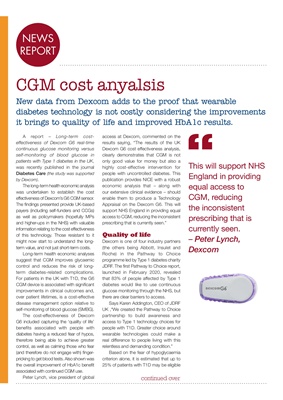
NEWS
NEWS
REPORT
New data from Dexcom adds to the proof that wearable
diabetes technology is not costly considering the improvements
it brings to quality of life and improved HbA1c results.
A report - Long-term costeffectiveness
of Dexcom G6 real-time
continuous glucose monitoring versus
self-monitoring of blood glucose in
patients with Type 1 diabetes in the UK,
was recently published in the journal
Diabetes Care (the study was supported
by Dexcom).
The long-term health economic analysis
was undertaken to establish the cost
effectiveness of Dexcom's G6 CGM sensor.
The findings presented provide UK-based
payers (including self-funders and CCGs)
as well as policymakers (hopefully MPs
and higher-ups in the NHS) with valuable
information relating to the cost effectiveness
of this technology. Those resistant to it
might now start to understand the longterm value, and not just
Long-term health economic analyses
suggest that CGM improves glycaemic
control and reduces the risk of longterm diabetes-related
complications.
For patients in the UK with T1D, the G6
CGM device is associated with significant
improvements in clinical outcomes and,
over patient lifetimes, is a cost-effective
disease management option relative to
self-monitoring of blood glucose (SMBG).
The cost-effectiveness of Dexcom
G6 included capturing the 'quality of life'
benefits associated with people with
diabetes having a reduced fear of hypos,
therefore being able to achieve greater
control, as well as calming those who fear
(and therefore do not engage with) fingerpricking to get blood tests. Also shown was
the overall improvement of HbA1c benefit
associated with continued CGM use.
Peter Lynch, vice president of global
CGM cost anyalsis
access at Dexcom, commented on the
results saying, "The results of the UK
Dexcom G6 cost effectiveness analysis,
clearly demonstrates that CGM is not
only good value for money but also a
highly cost-effective intervention for
people with uncontrolled diabetes. This
publication provides NICE with a robust
economic analysis that - along with
our extensive clinical evidence - should
enable them to produce a Technology
Appraisal on the Dexcom G6. This will
support NHS England in providing equal
access to CGM, reducing the inconsistent
prescribing that is currently seen."
Quality of life
Dexcom is one of four industry partners
(the others being Abbott, Insulet and
Roche) in the Pathway to Choice
programme led by Type 1 diabetes charity
JDRF. The first Pathway to Choice report,
launched in February 2020, revealed
that 83% of people affected by Type 1
diabetes would like to use continuous
glucose monitoring through the NHS, but
there are clear barriers to access.
Says Karen Addington, CEO of JDRF
UK "We created the Pathway to Choice
partnership to build awareness and
access to Type 1 technology choices for
people with T1D. Greater choice around
wearable technologies could make a
real difference to people living with this
relentless and demanding condition."
Based on the fear of hypoglycaemia
criterion alone, it is estimated that up to
25% of patients with T1D may be eligible
continued over"This will support NHS
England in providing
equal access to
CGM, reducing
the inconsistent
prescribing that is
currently seen.
- Peter Lynch,
Dexcom